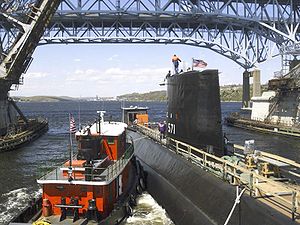USS Nautilus (SSN-571)

The retired Nautilus heads home on 8 May 2002, after preservation by the Electric Boat Division
|
|
| History | |
|---|---|
|
|
|
| Name: | USS Nautilus |
| Awarded: | 2 August 1951 |
| Builder: | General Dynamics |
| Laid down: | 14 June 1952 |
| Launched: | 21 January 1954 |
| Sponsored by: | Mamie Eisenhower |
| Completed: | 22 April 1955 |
| Commissioned: | 30 September 1954 |
| Decommissioned: | 3 March 1980 |
| Struck: | 3 March 1980 |
| Status: | Museum ship |
| General characteristics | |
| Type: | Nuclear submarine |
| Displacement: |
|
| Length: | 320 ft (98 m) |
| Beam: | 28 ft (8.5 m) |
| Draft: | 26 ft (7.9 m) |
| Installed power: | 13,400 hp (10,000 kW) |
| Propulsion: | STR nuclear reactor (later redesignated S2W), geared steam turbines, two shafts |
| Speed: | 23 kn (43 km/h; 26 mph) |
| Complement: | 13 officers, 92 enlisted |
| Armament: | 6 torpedo tubes |
|
Nautilus (Nuclear Submarine)
|
|

USS Nautilus docked at the Submarine Force Library and Museum
|
|
| Location | Groton, Connecticut |
| Built | 1954 |
| Architect | General Dynamics Corporation |
| Architectural style | Other |
| NRHP Reference # | 79002653 |
| Significant dates | |
| Added to NRHP | 16 May 1979 |
| Designated NHL | 20 May 1982 |
USS Nautilus (SSN-571) was the world's first operational nuclear-powered submarine. The vessel was the first submarine to complete a submerged transit of the North Pole on 3 August 1958. Sharing names with Captain Nemo's fictional submarine in Jules Verne's Twenty Thousand Leagues Under the Sea, and named after another USS Nautilus (SS-168) that served with distinction in World War II, Nautilus was authorized in 1951 and launched in 1954. Because her nuclear propulsion allowed her to remain submerged far longer than diesel-electric submarines, she broke many records in her first years of operation, and traveled to locations previously beyond the limits of submarines. In operation, she revealed a number of limitations in her design and construction. This information was used to improve subsequent submarines.
Nautilus was decommissioned in 1980 and designated a National Historic Landmark in 1982. The submarine has been preserved as a museum ship in Groton, Connecticut, where the vessel receives around 250,000 visitors per year.
In July 1951 the United States Congress authorized the construction of a nuclear-powered submarine for the U.S. Navy, which was planned and personally supervised by Captain (later Admiral) Hyman G. Rickover, USN, known as the "Father of the Nuclear Navy." On 12 December 1951 the US Department of the Navy announced that the submarine would be called Nautilus, the fourth U.S. Navy vessel officially so named. The boat carried the hull number SSN-571. The Nautilus benefited from the GUPPY improvements to the American Gato-, Balao-, and Tench-class submarines.
...
Wikipedia

